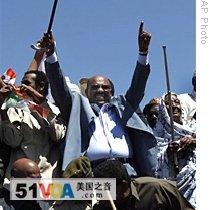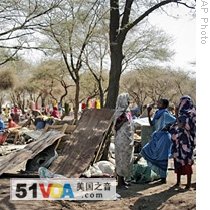Geneva
06 March 2009
 |
| Sudanese President Omar al-Bashir waves his cane in front of thousands of supporters at the entrance of the presidential palace in Khartoum, 05 Mar 2009 |
The United Nations calls the expulsion of 13 leading international non-governmental organizations from Darfur catastrophic. It says it will be impossible to administer humanitarian aid to millions of civilians in this strife-torn region without their assistance.
It says this action by the Sudanese government is totally unacceptable. The government of Omar al-Bashir told the private aid agencies to leave the country after the International Criminal Court issued an arrest warrant for the Sudanese president.
He is charged with war crimes and crimes against humanity committed during the six-year Darfur conflict.
The UN High Commissioner for Human Rights, Navi Pillay, joins the UN secretary-general in condemning the expulsions. She says this could prove disastrous given the life-saving work performed by private aid agencies, such as Oxfam, Save the Children and Care International.
Her spokesman, Rupert Colville, says the U.N. Human Rights Office will examine whether Sudan's decision to expel aid groups violates basic human rights and could constitute a war crime.
"To knowingly and deliberately deprive such a huge group of civilians of the means to survive is a deplorable act," he said. "Humanitarian assistance has nothing to do with the ICC [International Criminal Court] proceedings. To punish civilians because of the decision of the ICC is a grievous dereliction of the government's duty to protect its own people."
 |
| Displaced Darfurians arrive in the Zamzam refugee camp in northern Darfur, Sudan, 26 Feb 2009 |
The U.N. says private aid agencies are vital to its humanitarian operations. It says they distribute much of the relief to the needy. It warns the loss of these non-governmental organizations means that more than one million people will be without food, 1.5 million without health care, and over one million without drinkable water.
A spokeswoman for the World Health Organization, Fadela Chaib, says the expulsion of the aid agencies could lead to increased mortality and morbidity due to the interruption of health services.
"And, also can include declining immunization coverage and increasing mortality among children if they do not have access to therapeutic feeding and nutrition services," she said. "And, also what is very important for WHO, these NGO's were helping us also do surveillance of infectious diseases."
Chaib warns of possible outbreaks of infectious diseases, such as diarrhea and respiratory infections, if the NGO's no longer are available to monitor the emergence of disease.
The United Nations reports the expulsion order came as aid agencies were battling an outbreak of meningitis in Kalma Camp in southern Darfur, home to 90,000 people.